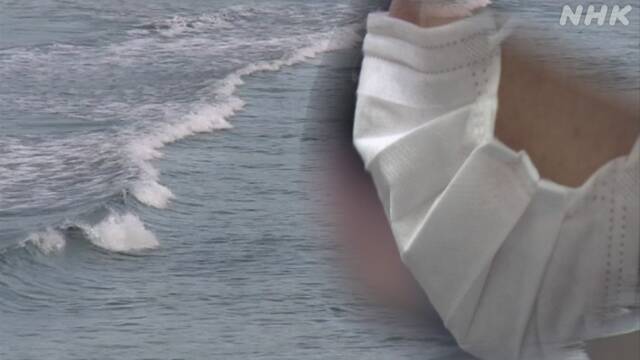“Corona litter” such as masks and gloves Increasing in seas and rivers around the world 4:23, July 23
The 23rd is "Sea Day", but it was found that so-called "corona garbage" such as masks and gloves, whose demand has increased due to the spread of the new coronavirus, has been found in seas and rivers around the world.
Environmental groups have warned that such wastes pose a threat to the environment, such as becoming microplastics, which are concerned about their impact on the ecosystem.
According to a nature conservation organization in Hong Kong, which is active mainly in Asia, so-called “corona dust” such as masks will become noticeable around the end of February due to the spread of the new coronavirus on the coast around Hong Kong. It was.
Also in Europe, NPOs that collect marine litter mainly in southern France began to see masks and empty containers for rubbing alcohol in May, and more than 100 masks were collected just last month. I am.
Furthermore, according to the French Tara-Ocean Foundation, which surveys marine pollution around the world using exploration vessels, masks and gloves were found in all 10 rivers such as the Thames and Seine surveyed last month. That is.
“The non-woven mask is made of plastic. Microplastics, which are not only accidentally swallowed by animals, but are also concerned about their impact on the ecosystem, and smaller microscopic It will become a fiber and become a big threat."
"Corona garbage" in Japan
So-called "corona litter" such as masks has also been found one after another in rivers and coasts of Japan.
According to the NPO corporation “Umi Sakura”, which has been cleaning activities on the Katase coast in Fujisawa City, Kanagawa Prefecture since 2005, many masks and sterilizers have been released since the middle of last month when cleaning was suspended due to the new coronavirus. Papers are now available.
Previously, we could only find one mask by cleaning one day, but now it increases to about 15 masks a day, and more masks will flow to the beach the next day after rain.
"Umisakura" Chairman Junichiro Furusawa said, "It's not just a problem for Japan or a problem for the world. It's important to think carefully about what kind of mask to use and how to throw it away as a problem for everyone." We ask that you carefully consider the impact on the environment when using.
Progress in development of plant-based masks
Under these circumstances, masks and other products made from plant-based materials are being developed around the world.
The University of British Columbia, Canada, is developing a "biodegradable" mask that is decomposed by microorganisms into water and carbon dioxide from wood fibers.
British companies have also succeeded in developing plastic-free face shields. In addition to using wood pulp for the part that covers the face, the transparency is secured, and the price is 1.5 pounds, which is about 200 yen in Japanese yen, which is almost the same as plastic products.
One of the founders, Ian Bates, said, "We made everything from wood pulp, paper, and other things that are returned to the soil. To meet the increasing demand, we were able to produce 2 million pieces per week."
These efforts have begun in Japan, and some companies are manufacturing masks using starch extracted from plants.
Expert "Need to create a mechanism for society as a whole"
Regarding the situation where so-called "corona garbage" is found in various parts of the world, Associate Professor Sadao Harada of Osaka University of Commerce, which specializes in environmental policy, said, "It's not limited to foreign countries. A non-woven mask is made of plastic, not a cloth that returns to the soil, but many people don't know, "First, it is important to tell consumers exactly what material the mask is made of. That's it."
Also, regarding the development of products that use materials that replace plastics, "It is important to use new materials that have less impact on the environment, but you should positively utilize what you can use originally." It is a wise choice to use it while considering the balance between environmental impact and infection control, such as giving priority to medical sites that need disposable plastic products."
On top of that, it is important for each person to be aware of environmental issues, but it is said that relying on individual morals alone will not solve the problem. “Based on scientific grounds, what is effective in infection control, and also in terms of cost Is it possible? It is important to create a mechanism for the society as a whole, such as thinking in order and using subsidies.”

